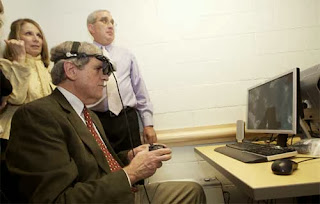How do psychologists help people with mental problems like phobias, neuroses, anxieties?
Psychologists have a treasure chest of techniques like Individual and group counseling, Biofeedback, Visual imaging or Conditioning techniques.
Photo source:
Photo source:
Mind is a Manifestation of the Brain
The most fundamental paradigm in modern Western psychology is the assumption that the mind is a manifestation of the human brain. In contrast, most of humanity’s religious and spiritual traditions believe in the existence of Die Seele or the soul.
As neither the mind nor the soul can be seen, touched, smelt or located, the only approach is through the senses of the body. Thus, even despite the centrality of sex for Freud debate, the human body is vital for psychology.
As neither the mind nor the soul can be seen, touched, smelt or located, the only approach is through the senses of the body. Thus, even despite the centrality of sex for Freud debate, the human body is vital for psychology.
Studying the Word 'Hand' in many Languages Reveals Hidden Connections Between Cultures
One famous Finnish psychologist, Juhani Heiska, from Savonlinna, Finland, who has helped thousands of people with their mental issues during 30 years of dedicated practice, has developed an extraordinary hobby about the human body.
An author of many articles and books on pre-emptive and preventive mental health work and a frequent lecturer, he has collected the words used to refer to ‘hand’ in almost all known languages.
An author of many articles and books on pre-emptive and preventive mental health work and a frequent lecturer, he has collected the words used to refer to ‘hand’ in almost all known languages.
- He observes how the Osidongo people in Angola, Africa use the word Keso for hand, while the Finns use Käsi.
- The Tibetans used the word Manu, which is similar to the Latin Manus.
Now, it would be rather hasty to suggest that ancient Tibetans and Romans came from same origins or that the Osidongans and the Finns just changed skin colour over the centuries. Heiska has noticed that the root words in every language could be grouped into as many groups as the language has letters.
Is it a mere accident that different languages have similarities or do they reveal more about human proto-culture?
Is it a mere accident that different languages have similarities or do they reveal more about human proto-culture?
- Hand in modern English probably comes from (Old English hond, from Proto Germanic. Khanduz. Hand is a widespread Germanic word (similar in German, Dutch and Swedish). The likeliest origin is that it is related to Gothic frahinthan 'seize', 'pursue', Swedish hinna 'reach' and English hunt.
Genetic Evidence to Track How Humans Evolved
Genetic Archeology has started using DNA very recently in the Great DNA hunt to plot ancient human migrations and how civilizations developed. The Genographic Project is a five-year project started in 2005 to collect DNA samples from over 100,000 people worldwide to understand how the Earth was colonised by humans.
DNA studies suggest that all humans today descend from a group of African ancestors who—about 60,000 years ago—began a remarkable journey.
One surprising finding is that human populations were quite small prior to the Late Stone Age, perhaps numbering fewer than 2,000 around 70,000 years ago.
One surprising finding is that human populations were quite small prior to the Late Stone Age, perhaps numbering fewer than 2,000 around 70,000 years ago.
Scientists also use other approaches for mapping out ancient human migrations. Scientists like Professor Alan Cooper of Australia's University of Adelaide try to understand ancient human migrations by studying pig remains.
In Heiska’s family, they have a history of longevity. His mother lived happily until 102. So he has lots of time for continuing his hands-on research.
Photo source:
Photo source:






4 comments:
Very interesting post.
Are there any conclusion to be had from this 'hand' project?
Very interesting post. It'd be great to see more about the hand stuff. Any conclusions?
Thanks John and Julia about your comments.
Greatt read thank you
Post a Comment